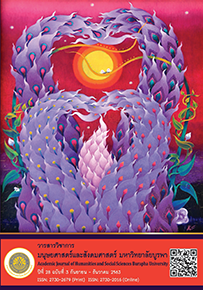A Reflection of Parenting Styles and Impacts on Behaviors of Children in The Joy Luck Club
Main Article Content
Abstract
This qualitative research was conducted with two objectives for this study: 1) to analyze parenting styles and the reasons of the parent characters for being parents of those styles in an Ami Tan’s famous novel named The Joy Luck Club and 2) to investigate the impacts of the parenting styles on behavior of the daughter characters in The Joy Luck Club. From the analysis based on the analysis framework which developed from Baumrind’s Theory of Parenting Styles and elaborated by Maccoby and Martin (1983), it was found that the parenting style in The Joy Luck Club was rather associated with authoritarian parenting style. The mother characters set rules and command their daughters to follow the rules. They physically and verbally punish their daughters. The daughters react aggressively. However, the personalities and behaviors of the children do not agree with those introduced in the theory. Although it was found that the mothers do not explain the real reasons for prohibiting some actions. This makes the daughters curious and confident to make decision on their own. The reason behind the mothers’ force is their desire to see their daughters’ happiness and success. They do not want their daughters to encounter bad experience and sufferings as they had in the past. A factor that makes the daughters feel uncomfortable with the mothers’ teaching is the conflict between the American culture in which the daughters grow outside their homes and the Chinese culture which their mothers are trying to implant into them.
Downloads
Article Details
บทความทุกบทความเป็นลิขสิทธิ์ของวารสารวิชาการมนุษยศาสตร์และสังคมศาสตร์ มหาวิทยาลัยบูรพาเท่านั้น
References
Aunola, K., Stattin, H., & Nurmi, J. (2000). Parenting styles and adolescents’ achievement strategies. Journal of Adolescence, 23(2), 205-222. Retrieved from https://doi.org/10.1006/jado.2000.0308
Baba, S. (2018). What does family mean to you?. Retrieved from https://www.bestrongfamilies.org/news/2018/9/28/what-does-family-mean-to-you
Back, A. (1994). “The Joy Luck Club” and guidance for Chinese young people in Australian schools. Journal of Psychologists and Counsellors in Schools, 4, 107-114. Retrieved from https://doi.org/10.1017/S1037291100001953
Baumrind, D. (1971). Current patterns of parental authority. Developmental Psychology Monograph, 4, 1-103.
Baumrind, D. (1991). The influence of parenting style on adolescence competence an substance use. Journal of Early Adolescence, 11(1), 56-95. Retrieved from https://doi.org/10.1177/0272431691111004
Bi, X., Yang, Y., Li, H., Wang, M., Zhang, W., & Deater-Deckard, K. (2018). Parenting styles and parent-adolescent relationships: the mediating roles of behavioral autonomy and parental authority. Frontiers in Psychology, 9, 1-13. Retrieved from https://doi.org/10.3389/fpsyg.2018.02187
Braun, V., & Clarke, V. (2006). Using thematic analysis in psychology. Qualitative Research in Psychology, 3, 77-101.
Brown, J., & Brown, P. (2003). A guide to parenting. Lincolnshire: The Stanborough Press.
Darling, N., & Steinburg, L. (1993). Parenting styles as context: An integrative model. Psychological Bulletin, 113(3), 487-496.
Feldman, R. S. (2008). Adolescence. NJ: Pearson Education.
Heath, P. (2013). Parent-child relations: Contexts, research, and application (3rd ed.). NJ: Pearson Education.
Maccoby, E., & Martin, J. (1983). Socialization in the context of the family: Parent-child interaction. In E. M. Hetherington (Ed.) & P. H. Mussen (Series Ed.), Handbook of child psychology: Vol. 4. socialization, personality, and social development (pp. 1-101). New York: Wiley.
Maccoby, E. (2000). Parenting and its effects on children: On reading and misreading behavior genetics. Annual Reviews, 51, 1-27. Retrieved from https://www.annualreviews.org/doi/pdf/10.1146/annurev.psych.51.1.1
Mistri, Z. (1998). Discovering the ethnic name and the genealogical tie in Amy Tan’s The Joy Luck Club. Studies in Short Fiction, 35(3), 251. Retrieved from https://go.gale.com/ps/anonymous?id=GALE%7CA83585386&sid=googleScholar&v=2.1&it=r&linkaccess
Sehwised, W. (2007). A study of conflict between mothers and daughters in The Joy Luck Club. Master’s thesis, Faculty of Humanities, Srinakharinwirot University.
Schultermandl, S. (2011). The politics of transnational memory in Amy Tan’s The Joy Luck Club. The Journal of Transformational American Studies, 11(1), 79-101. Retrieved from https://escholarship.org/uc/item/1ks1v1vj
Shehzad, W. (2020). Parenting styles and emotional intelligence: A cultural study on secondary school students in China. International Journal of Psychosocial Rehabilitation, 24(7), 5641-5647. Retrieved from https://www.researchgate.net/publication/340547630_Parenting_Styles_and_Emotional_Intelligence_A_Cultural_Study_on_Secondary_School_Students_in_China
Tan, A. (1989). The joy luck club. New York: Ivy Book.
Zahedani, Z. et al. (2016). The influence of parenting style on academic achievement and career path. Journal of Advances in Medical Education & Professionalism, 4(3), 130-134. Retrieved from https://www.ncbi.nlm.nih.gov/pmc/articles/PMC4927255/


